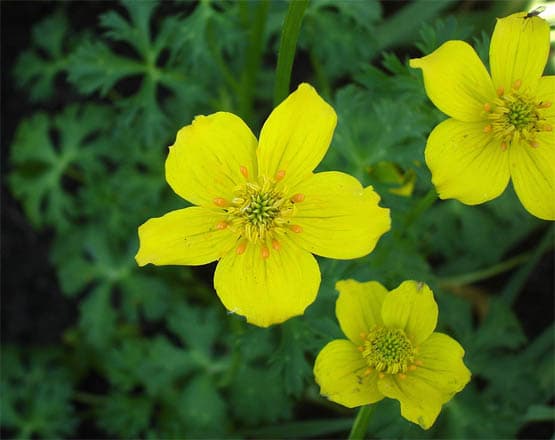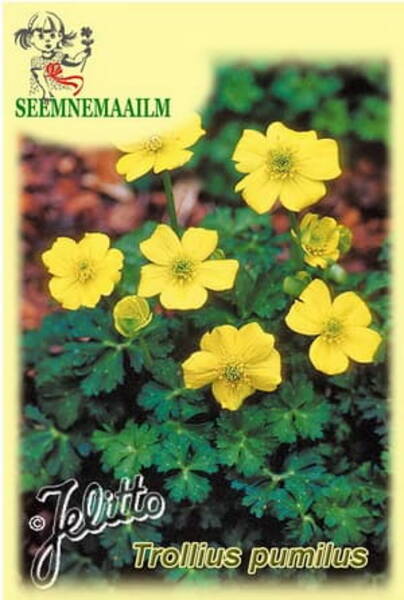Your shopping cart is empty!
Globeflower
Globeflower - Trollius pumilus.
Perennial from the family Ranunculaceae.
Origin: Bhutan, Northern Myanmar, Nepal, Sikkim (swamps, mountain meadows).
Flower colour: golden yellow.
Foliage: rounded, basal leaves 3-5-parted, serrate, dark green.
Flowering plant height: 20 cm.
Distance between plants: 30 cm.
Natural flowering period: June - July.
Winter hardiness zones: Z4 - Z7.
Soil requirements: moist, medium fertility.
Usage: for rock garden, as a flowering potted plant.
Plant together in cool, moist soils in the rock garden or along pathways with Caltha palustris var. alba, Iris setosa var. canadensis and Juncus filiformis "Spiralis".
1,0 g = 1300 seeds.
Germination: Most species of the Ranunculus-family need lower temperatures during the cooling-period - about -5°C. The reason is probably the freezing point of these seeds, which is at -7°C, while most other seeds freeze at -5 °C. The sowing must be kept warm (about +18 to 22°C) and moist for the first 2-4 weeks. After this period the sowing must be kept at a cold temperature (between -4 and +4°C) for another 4-6 weeks. It is not so important if the temperature is higher or lower during the cooling period, but the cooling period has to be prolonged because the synthesis of the germination inducer, hormonlike acid, slows down or comes to a standstill. It is beneficial to cover the sowing with snow during the cooling-period. The temperature below it usually keeps in the optimum range of -4 to 0°C. The sowing is kept moist, and the melting snow helps to destroy the shell, which is advantageous for the germinating seedling. After this cooling-period the sowing may not be immediately exposed to high temperatures. The most effective temperatures are between +5 to 12°C, even if germination has started. The best location for this sowing, even in March, April and May, is the open field, the cold frame or a cold greenhouse.
Best Sowing Dates: November - March Sowing to Germination: 9 - 12 weeks.
Germination to Transplant: 4 - 8 weeks.
Transplanting to Salable Plant: 6 - 10 weeks.
Perennial from the family Ranunculaceae.
Origin: Bhutan, Northern Myanmar, Nepal, Sikkim (swamps, mountain meadows).
Flower colour: golden yellow.
Foliage: rounded, basal leaves 3-5-parted, serrate, dark green.
Flowering plant height: 20 cm.
Distance between plants: 30 cm.
Natural flowering period: June - July.
Winter hardiness zones: Z4 - Z7.
Soil requirements: moist, medium fertility.
Usage: for rock garden, as a flowering potted plant.
Plant together in cool, moist soils in the rock garden or along pathways with Caltha palustris var. alba, Iris setosa var. canadensis and Juncus filiformis "Spiralis".
1,0 g = 1300 seeds.
Germination: Most species of the Ranunculus-family need lower temperatures during the cooling-period - about -5°C. The reason is probably the freezing point of these seeds, which is at -7°C, while most other seeds freeze at -5 °C. The sowing must be kept warm (about +18 to 22°C) and moist for the first 2-4 weeks. After this period the sowing must be kept at a cold temperature (between -4 and +4°C) for another 4-6 weeks. It is not so important if the temperature is higher or lower during the cooling period, but the cooling period has to be prolonged because the synthesis of the germination inducer, hormonlike acid, slows down or comes to a standstill. It is beneficial to cover the sowing with snow during the cooling-period. The temperature below it usually keeps in the optimum range of -4 to 0°C. The sowing is kept moist, and the melting snow helps to destroy the shell, which is advantageous for the germinating seedling. After this cooling-period the sowing may not be immediately exposed to high temperatures. The most effective temperatures are between +5 to 12°C, even if germination has started. The best location for this sowing, even in March, April and May, is the open field, the cold frame or a cold greenhouse.
Best Sowing Dates: November - March Sowing to Germination: 9 - 12 weeks.
Germination to Transplant: 4 - 8 weeks.
Transplanting to Salable Plant: 6 - 10 weeks.

Globeflower.















